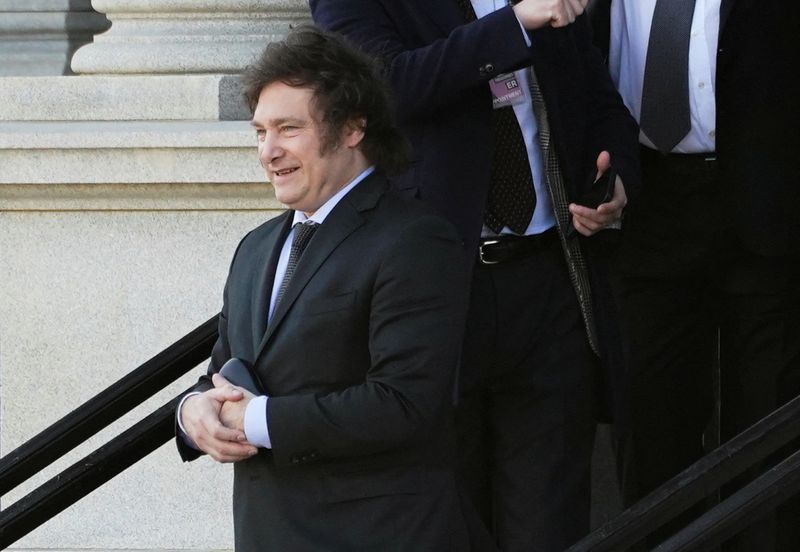With soy and lithium trade in the balance, Argentina’s Milei has a China conundrum

By Lucinda Elliott, Joe Cash and Maximilian Heath
BUENOS AIRES/BEIJING (Reuters) – Argentina’s President-elect Javier Milei has a China conundrum.
The libertarian economist insulted communist-run China in a fiery campaign, but takes office on Sunday needing the country’s second-largest trade partner more than ever as a recession looms and foreign currency reserves run dry.
Since he won the Nov. 19 election, Milei’s team have taken a more diplomatic tone, reflecting complex ties with China, the top buyer of Argentine soybeans and beef, a key investor in its lithium, and the provider of an $18 billion currency swap – effectively, a form of credit provision that has helped Argentina avoid default.
Miguel Schiariti, president of the local CICCRA meat industry chamber, is hopeful of a “cordial” relationship, pointing to recent comments by incoming foreign minister Diana Mondino. China buys over three-quarters of Argentina’s beef exports.
Mondino told Reuters in a Dec. 2 interview that the new government would review “secret” state-to-state deals to ensure they were all above-board, but emphasized Argentina would not cut ties with China, and would look in fact to bolster private trade.
“The private sector is the one that makes the deals,” she said, adding that Argentina wanted to “export as much as possible to everyone.” The new government will be keen to overturn trade deficits, she said, including with China – around $10 billion last year.
“We have a lot of debt… so we need a positive surplus.”
‘PROJECTS WILL BE REVIEWED’
Not everyone is convinced that things will be so easy, with sensitive mega-projects including hydroelectric and nuclear needing solid state-to-state relations.
In the southern province of Santa Cruz, Chinese-made turbines are set to arrive early next year for a $5 billion hydropower dam project, which the outgoing Peronist regional governor Alicia Kirchner said could be held up by the change in government.
“Those dams are at risk with Milei,” Kirchner said in an October interview, citing his public criticism of China during the campaign.
“(Milei) says we can be an island,” Kirchner said. “I don’t think the country has a future that way.”
Milei’s campaign has not spoken specifically about the dams.
China is providing financing for around a dozen ongoing infrastructure projects in Argentina, government data show, which range from railways and solar farms to space stations and fertilizer facilities. It also has a dozen mining investments, especially in electric-vehicle battery metal lithium.
Some projects are already facing big delays or are “paralyzed,” said Patricio Giusto, director of the Sino-Argentina observatory based in Buenos Aires, citing poor management, regulatory hurdles and domestic economic issues.
That could worsen if diplomatic ties are strained, he said. Cross-cancellation clauses in some contracts could allow Beijing to stop loans to projects if another one was canceled, he added.
“If Milei attempts to cancel any of these public works contracts, China would simply ask for the money back from any number of projects,” Giusto said. “That’s money Argentina simply doesn’t have.”
Construction of the two Santa Cruz hydropower plants, the biggest Chinese investment yet in Argentina and funded by the China Development Bank, began in 2015 but remains less than half complete, two provincial sources close to the work said.
Chinese investors would likely be practical, a senior diplomat in Buenos Aires said. “There won’t be confrontation with Argentina but projects will be reviewed.”
China’s embassy in Buenos Aires did not immediately respond to a request for comment.
‘OTHER PROBLEMS TO SOLVE FIRST’
China also gobbles up Argentina’s soybeans and other grains, buying over 93% of the country’s soy exports so far this year, official data show. It rises to almost 100% for barley and sorghum.
Overall, China accounts for some 10% of Argentine exports, and over a quarter of its imports.
“We believe that the foreign ministry will maintain relations and negotiations with China,” said Gustavo Idigoras, president of CIARA-CEC, which represents major grains exporters and crushing companies like Bunge and Cargill.
Meanwhile, China’s Gangfeng Lithium, Tsingshan Holding Group, and Zijin Mining have major investments in Argentina’s lithium sector, the world’s no. 4 producer of the “white gold” metal.
In China, experts saw a likely pragmatic relationship.
“Milei will view Argentina’s political relationship with China in economic terms. He used to be an economist, after all,” said Beijing-based Hu Yukun, a Chinese international relations commentator.
Hu predicted Milei would at most downgrade the relationship, but would, like previous governments, treat China as a crutch for the country’s economic woes, flagging the currency swap, which cash-strapped Argentina has used to pay back the International Monetary Fund (IMF).
The swap – of which some $11.5 billion has already been activated – could come into the crosshairs of Milei’s government, an Argentine central bank source said.
“It is now an issue for the next administration. The swap was useful to the current government because it avoided defaulting on payments with the IMF,” the source said.
Milei’s recently appointed economic team has not spoken about the currency swap but has had initial meetings with the IMF that Milei described as “collaborative.”
The swap “could be (impacted) because of what he has said about not having relations with China at the state level,” the source said. “But in recent weeks his speech has moderated and he has many other problems to solve first.”
(Reporting by Lucinda Elliott, Joe Cash, Maximilian Heath and Jorge Otaola; Additional reporting by Jorgelina do Rosario; Editing by Adam Jourdan and Rosalba O’Brien)